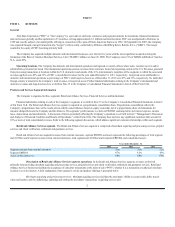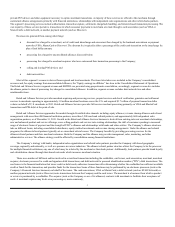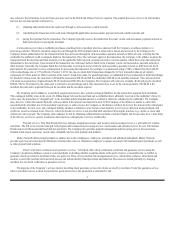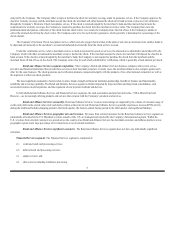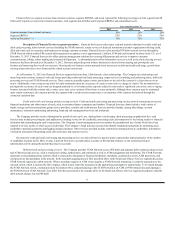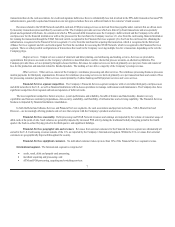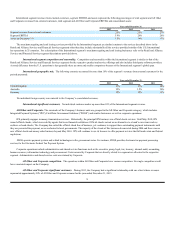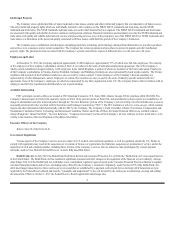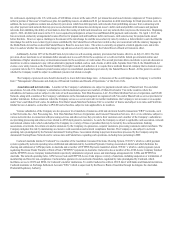First Data 2013 Annual Report Download - page 13
Download and view the complete annual report
Please find page 13 of the 2013 First Data annual report below. You can navigate through the pages in the report by either clicking on the pages listed below, or by using the keyword search tool below to find specific information within the annual report.
there are state laws restricting the ability to collect and utilize certain types of information such as Social Security and driver’s license numbers.
TeleCheck Services Inc. (“TeleCheck”) is subject to the Federal Fair Credit Reporting Act
(“FCRA”) and various similar state laws based on TeleCheck’s maintenance of a database containing the check-writing histories of consumers and the use of
that information in connection with its check verification and guarantee services.
The collection business within TRS Recovery Services, Inc. (“TRS”) is subject to the Federal Fair Debt Collection Practices Act and various similar
state laws. TRS has licenses in a number of states in order to engage in collection in those states. In the United Kingdom, FDRL has a license under the
Consumer Credit Act of 1974 (“CCA”) to enable it to undertake, among other things, credit administration and debt collections activities on behalf of its card
issuing customers through calls and correspondence with the cardholders. FDRL is also licensed under the CCA to carry on the activity of a consumer hire
business for the purpose of leasing terminals to merchants. The CCA establishes a comprehensive code of regulations for the origination, administration and
enforcement of credit and hire agreements.
Significant portions of federal regulatory oversight of both the Fair Credit Reporting Act and the Fair Debt Collection Practices Act have been transferred
from the Federal Trade Commission to the Consumer Financial Protection Bureau. TeleCheck and TRS are subject to regulation, supervision, and
examination from the Consumer Financial Protection Bureau. Further regulations may be imposed in the future as both state governments, the Consumer
Financial Protection Bureau and other federal agencies identify and consider supplementary consumer financial protection measures involving, among other
things, collection activities, the collection, storage and use of data and databases regarding consumers. In particular, laws regulating activities with respect to
current or emerging technology such as the use of automated dialers or pre-recorded messaging or calls to cellular phones could impair the collection by TRS of
returned checks, including those purchased under TeleCheck’s guarantee services. Moreover, reducing or eliminating access to and use of information on
drivers licenses, requiring blocking of access to credit reports or scores, mandating score or scoring methodology disclosure and proscribing the maintenance
or use of consumer databases, including a consumer’s rights to affect the usable content of databases, could reduce the effectiveness of TeleCheck’s risk
management tools or otherwise increase its costs of doing business.
In addition, several subsidiaries in the Company’s International segment are subject to comparable local laws regarding collection activities and
obtaining credit reports.
Certain of the Company’s businesses are subject to regulation by the U.S., including anti-
money laundering laws and regulations, including the Bank Secrecy Act, as amended by the USA PATRIOT Act of 2001 (collectively, the “BSA”). The
BSA, among other things, requires money services businesses (such as money transmitters, issuers of money orders and official checks, and providers of
prepaid access) to develop and implement risk-based anti-money laundering programs, report large cash transactions and suspicious activity, and to maintain
transaction records. Recently, the Financial Crimes Enforcement Network, the agency that enforces the BSA, finalized its rule that defines Stored Value under
the BSA, and places requirements on entities that are either the Provider or Seller of Prepaid Access. Money Network, a First Data entity, will be the Provider
of Prepaid Access for various open loop prepaid programs for which it is the Program Manager.
The Company is also subject to certain economic and trade sanctions programs that are administered by the Treasury Department’s Office of Foreign
Assets Control (“OFAC”) that prohibit or restrict transactions to or from or dealings with specified countries, their governments, and in certain circumstances,
their nationals, and with individuals and entities that are specially-designated nationals of those countries, narcotics traffickers, and terrorists or terrorist
organizations.
Similar anti-money laundering and counter terrorist financing and proceeds of crime laws apply to movements of currency and payments through
electronic transactions and to dealings with persons specified in lists maintained by the country equivalents to the OFAC lists in several other countries and
require specific data retention obligations to be observed by intermediaries in the payment process. The Company’s businesses in those jurisdictions are
subject to those data retention obligations.
The Company has developed and is enhancing global compliance programs to monitor and address legal and regulatory requirements and developments.
The Company is subject to various U.S. federal, state and foreign laws
and regulations governing money transmission and the issuance and sale of payment instruments.
In the U.S., most states license money transmitters and issuers of payment instruments. Many states exercise authority over the operations of the
Company’s services related to money transmission and payment instruments and, as part of this authority, subject the Company to periodic examinations.
Many states require, among other things, that proceeds from money transmission activity and
12


